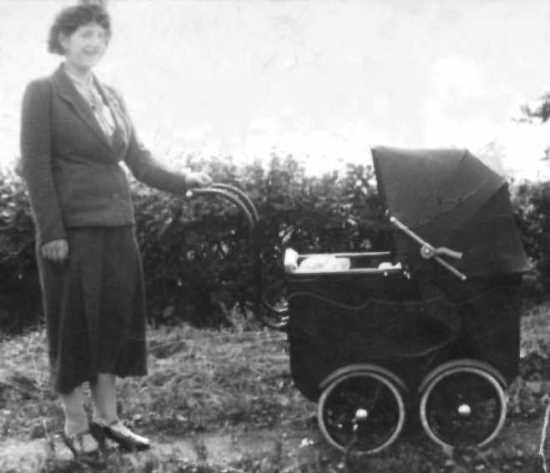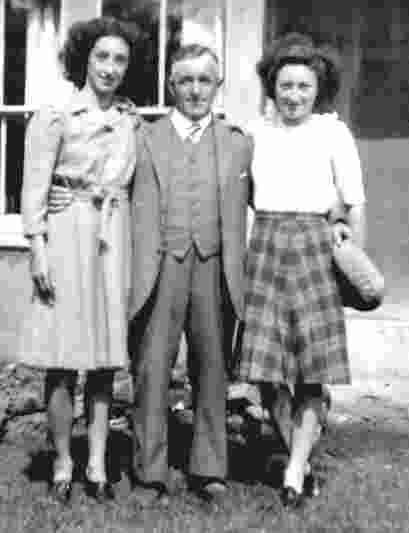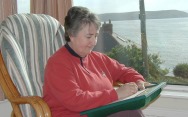CHAPTER 7
A New Generation and War begins
Our first baby arrived safely, a little girl. Leslie was delighted but I had really wanted a boy. We had agreed earlier that Leslie would choose the name if it was a girl and I would choose it if we had a boy. She was a beautiful baby with fair hair and we called her Margaret. We didn't buy the pram until after she was born. It was a great deep thing with good springs, much better than the prams of today.
 She was a very good baby and of course Granny and Grandad Holman thought the world of their first grandchild and she spent a lot of time with them. She was walking by the time she was ten months old so we got a large playpen and put her in the front garden. She seemed to enjoy playing there until one day when I walked past to feed the poultry she started crying. Grandad heard her and came rushing round to take her out accusing me of being cruel leaving her there to play. After that she became very crafty at getting his attention. It wasn't always easy bringing up a family whilst living next to grandparents however good they might have been to me, and they were very good.
She was a very good baby and of course Granny and Grandad Holman thought the world of their first grandchild and she spent a lot of time with them. She was walking by the time she was ten months old so we got a large playpen and put her in the front garden. She seemed to enjoy playing there until one day when I walked past to feed the poultry she started crying. Grandad heard her and came rushing round to take her out accusing me of being cruel leaving her there to play. After that she became very crafty at getting his attention. It wasn't always easy bringing up a family whilst living next to grandparents however good they might have been to me, and they were very good.
Leslie had three sisters and one younger brother still living at home at that time and we seemed to be as one big family.
Margaret was growing up very quickly. I used to walk her to the Middle Lane at dinner time to meet her Dad coming home from work with the horses. She loved to be put up on the horse for a ride. One day when they had arrived back to the fold her Dad jumped off the horse first as usual and then the horse jerked and threw Margaret off into a pool of water near the drinking trough. Luckily she suffered no harm but was a very wet and frightened little girl.
By the time the Second World War started we were expecting our second baby. As men over eighteen years of age were 'called-up' for 'National Service' in the army, farm work had to be done mostly by women who joined the Land Army. Leslie's sister Pam, a hairdresser, left her job to come back and work on the farm. Farming wasn't highly mechanised at that time so most of the work was manual. Two of Leslie's sister already worked on the farm along with him and Grandad, or Father as we usually called him.

Jean and Minnie would give Pam some really horrible jobs that they weren't keen on doing such as muck leading with the horse and cart. Pam had always enjoyed working with the horses ever since being a child, riding the pony and taking out the pony and trap. One day when she was unloading hay in the fold yard she was unaware that the bull was out of his shed. As it charged around the cart tossing the hay Pam climbed up on to the beams of the fold for safety.
Some mornings Pam and I would take Margaret along with us whilst we shook muck in the potato rows. She was such a good child, sitting at the end of the rows lacing and unlacing her little boots. In the afternoons she would stay with Granny.
It was quite hard work at this time as, not only was I pregnant with our second baby, but after working hard all day I had to go home in the evening and start on the housework. But it was a happy time.
As the war continued things began to be very scarce and ration books for food and coupons for clothes were introduced. We didn't fare too badly as we killed our own pigs even though it was illegal; we always had more than one. Some farmers killed more and hid them in straw stacks. We had to apply for papers that the butcher would sign when he had slaughtered one pig. The police would come round to collect these papers. After the police had been round the farmers would take the other slaughtered pigs out of hiding. We also grew our own vegetables. When we separated the milk we had cream and made butter in a small glass churn. There was not enough sugar, butter or flour rations to make cakes and if anybody wanted a cake they would have to go into Selby and stand in a queue for an hour or more.
Another big event in the village was when we bought the first tractor. It had great big iron wheels and was a clumsy affair. Leslie was to be the driver and tractor mechanic. It was fine driving it in the fields but very slow along the roads.
When we first moved to live in Cliffe there was no Sunday School at the Methodist Chapel so Leslie decided he would restart it. Money was raised by putting on concerts and it wasn't long before another young chap called John Falkingham became interested in helping and it soon grew.
Leslie and John joined the Home Guard and Grandad became an Air Warden. At 9 a.m. each Sunday the Home Guard would have to be 'On Parade' so Granny and Grandad took over the Sunday School but moved it over to the afternoon just before the Chapel Service. The services had to be held in daylight due to the 'black-out' restrictions.
Everyone had to have a 'black-out' system. We fixed some wooden shutters on the kitchen and sitting room windows and made curtains out of some heavy black material. A lot of the fothering had to be done in daylight but during periods of darkness stable lamps were half painted black. A heavy fine would be imposed on anyone showing a light. Grandad was accused of being seen across the yard and when he was fined he told the judge that anyone that could see that light from half a mile away had better sight than him as he had already tripped and fallen over the cattle several times. It cut no ice with the judge however.
One night as our second baby was due to be born Leslie was knocked up out of bed. It was one of the less bright of the Home Guard in a bit of a panic saying that the 'Gerrys' had arrived and were coming up the railway from Wressle. Leslie had to go on duty to Hemingborough Station but managed to slip away after three hours to check if I needed a doctor. It turned out just to be another hoax. As we lay in bed we often used to count the bombing aircraft flying over on their way from Breighton to Germany.
There was no worry however and the baby finally arrived safely.



